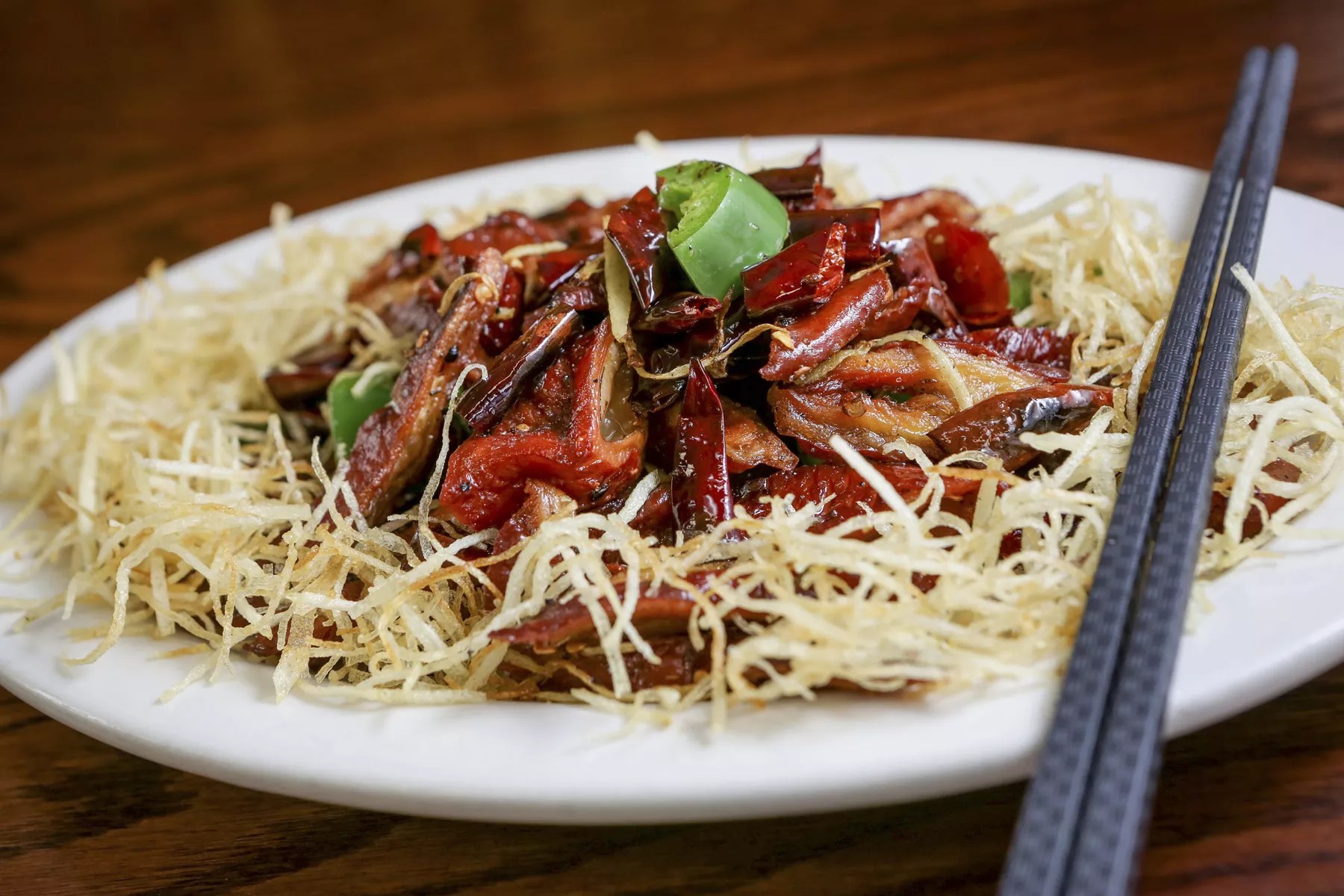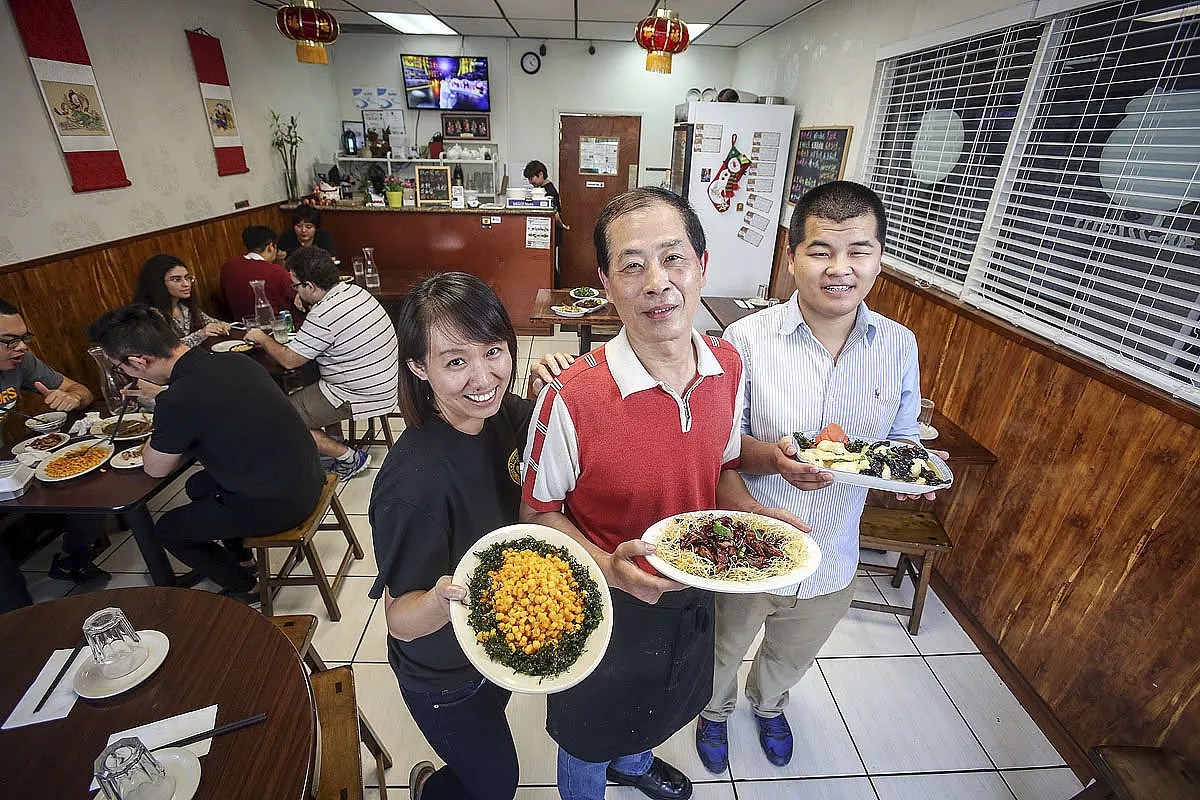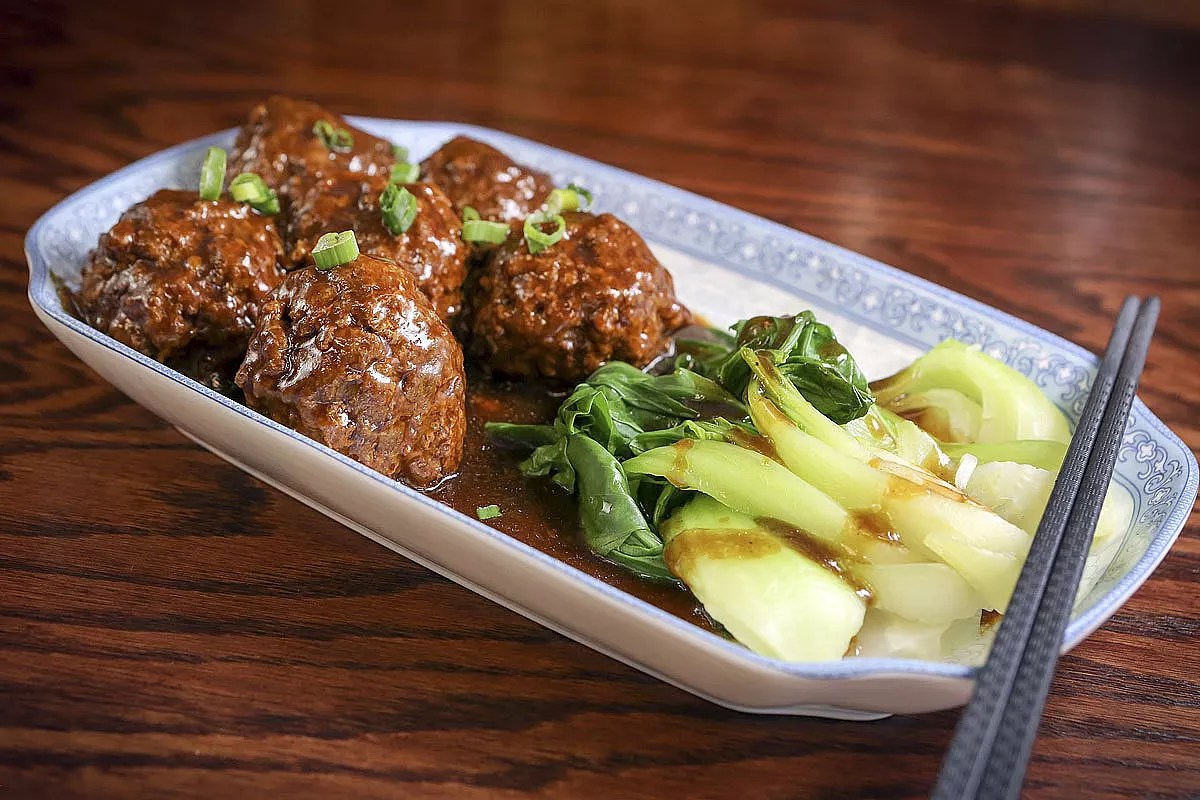
Photo by CandaceWest.com

Audio By Carbonatix
No place in Miami serves Chinese food quite like Chinese Guy. It’s clear the moment you step inside the compact 30-seater, which is nestled in a dark corner of a far-flung West Flagler Street strip mall. On nearly every table, plates are piled high with neon-orange pumpkin wedges and sunflower-yellow corn. Both are sautéed in a salty, rich potion of preserved duck egg yolks and a fragrant seasoned oil punched up with garlic, ginger, and possibly a dash of MSG. Together in a hot pan, they create a sauce and a brittle crust.
Soon quick-fried pork kidneys snap palates to attention. The offal is diced into bite-size bits and then scored, giving each morsel a turtle-shell pattern. A rush of heat from a ripping-hot wok brings the meat up to temperature without overdoing it, leaving each bite tender without any metallic gaminess. Ruffly wood ear mushrooms; bright, crisp wedges of radish; and grassy, still-crunchy bok choy round things out.
Such offerings were exceedingly rare in Miami-Dade when Chinese Guy’s owner, Kun Bao, moved here in 2010 to study engineering at Florida International University. He scoured the county, from the Chinese enclave in North Miami Beach to West Dade, hoping to find someplace cooking the often fermented, fast-fried, and sometimes spicy cuisine of his native Tianjin.
A blitz of precisely cooked dishes smacks of sweet, sour, and spice.
Will you step up to support New Times this year?
At New Times, we’re small and scrappy — and we make the most of every dollar from our supporters. Right now, we’re $18,000 away from reaching our December 31 goal of $30,000. If you’ve ever learned something new, stayed informed, or felt more connected because of New Times, now’s the time to give back.
Unsuccessful, he sought help from his Chinese classmates, many of whom, like Bao, made their way to South Florida through FIU’s partnership with China’s Tianjin University of Commerce, which is situated in the sprawling northern port city of more than 15 million.
“We were all asking each other where to find our food,” says the stout 27-year-old with piercing black eyes and a thick black buzzcut. No one knew. His days of tender soy-braised pig trotters, steamed fish in pickled cabbage soup, and fatty pork rib tips atop sweet, sticky glutinous rice seemed long gone.
But then, a year later, Bao met his now-wife, 28-year-old Yanan Cai, and the pair began planning a restaurant. They would provide regional Chinese cuisine flipped out of coal-black woks. Chinese Guy owners Yanan Cai (left) and Kun Bao (right) with chef Fang He Photo by CandaceWest.com
Local universities in recent years have been pursuing Chinese students to boost their international bona fides – and for the windfall from those who pay full tuition. The campaign has had the happy, unintended consequence of dramatically pushing Miami’s Chinese dining options past Westernized honey garlic chicken and the familiar soups and brown gravies of Cantonese fare. A handful of chefs and restaurateurs have taken note and opened Sichuan restaurants such as CY Chinese on NE 163rd Street and Dragon One Chinese on West Flagler Street. Chinese Guy is among the pioneers of North Chinese cuisine in Miami.
After Bao and Cai returned home to Tianjin to marry in 2013, they shelved the idea of a traditional lavish wedding reception and plunged $100,000 from their parents into the space that today is filled with dark-stained wooden tables and intricate Chinese Buddhist illustrations. They opened the restaurant in 2014, and today it’s Cai, whose shoulder-length black hair barely contains her wide smile, who runs it day-to-day. To oversee the menu, they hired Fang He, the former chef of the Chinese embassy in Ottawa, who most recently ran things at nearby Lung Gong, a long-standing, reliably traditional West Dade Chinese place.
From the kitchen comes a blitz of precisely cooked dishes that smack of sweet, sour, and spice. Chili oil rife with the aroma of ginger is tossed with chilled enoki mushrooms and pencil-thin shreds of braised pig ears. They’re light yet satisfying appetizers that wake you up like a bucket of cold water.
The kitchen smokes firm tofu, giving it a chocolate-hued veneer with a pleasing amount of salt and charred, woody flavor. The bean-curd blocks are then diced into pinkie-width cubes and tossed with firm soybeans and pickled mustard greens, which lend a much-needed touch of acidity.
Asked about his Yangzhou meatballs, a wide grin breaks out across Bao’s gently creased face. It’s a dish he’s been perfecting for years, and like those quick-fried kidneys, it’s as much about technique as it is about the ingredients. “The ground meat in America is too hard,” he says. “You have to find a way to make it soft.” To do so, he blends ground chuck with dashes of water and egg whites and then pulverizes it using a mortar and pestle until a delicate, fluffy paste emerges. Yangzhou meatballs Photo by CandaceWest.com
When it’s time to cook, the oil is warmed to a point somewhere between the temperatures used for poaching and frying. If it’s too cool, the balls won’t cook fast enough and eventually disintegrate. Too hot and the meat seizes up and becomes tough. Once finished, the spheres are rolled in a simple glaze of soy, salt, and sugar that serves as more of a seasoning than a stand-alone flavoring.
He deploys a similar technique for the Jiuniang fish. In this case, curls of tilapia are gently poached with loamy wood ear mushrooms, leaving the pearly-white flesh butter-soft and floating in a pool of seasoned oil punched up with a hint of rice wine. A handful of scallion slivers and grated ginger are thrown in at the last moment, offering a pop of spice and nose-tickling perfume. The dish would be better if it were prepared with something other than a flavorless industrial fish, but doing so would likely increase the reasonable $11.95 price.
And if it’s offal you want, Chinese Guy is happy to oblige. The dry-fried pork intestine (which the menu terrifyingly describes as colon) should be a favorite. The crisp exteriors and fatty interiors of the fried hoops aren’t all that different from the oleaginous hunks of fried pork belly available by the bagful at El Palacio de los Jugos.
Then there’s the staff. They help guide novices and experienced diners through a menu that at first glance can be overwhelming. Most often it’s Cai, bursting with energy, advising you to order those Yangzhou meatballs but also warning you not to get them next time. There’s simply too much to try.
Chinese Guy
10340 W. Flagler St., Miami; 305-227-3111; chineseguy.us. Monday, Tuesday, and Thursday 11 a.m. to 10:30 p.m., Friday 11 a.m. to 11 p.m., Saturday noon to 11 p.m., Sunday noon to 10:30 p.m.
- Enoki mushrooms with chili oil $6.95
- Pork intestine with dried chili $13.95
- Yangzhou meatballs $14.95
- Smoked tofu with pickled green beans $9.95
- Jiuniang leavened fish $11.95
- Quick-fried pork kidney $13.95
- Soy fried rice with salt pork $8.95
- Baked corn with salted egg yolk $12.95